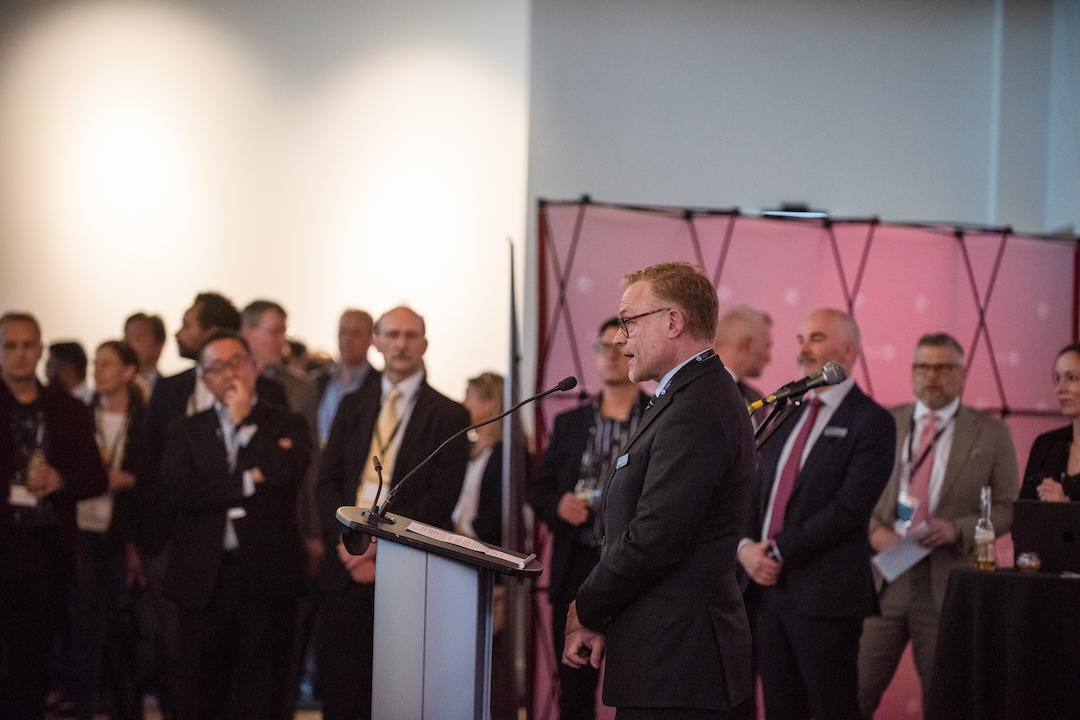Delegates to the third annual Canadian Hydrogen Convention, which runs from April 23 to 25 at the Edmonton Convention Centre, include officials from Romania, Japan, South Korea, and Taiwan, and even Andrzej Duda, the president of Poland.
"It's the first time we've had a president of a nation speaking at this event," said Brent Lakeman, Edmonton Global's hydrogen initiative director and the chair of the convention. "(Poland is) dealing with some very similar challenges that we've dealt with, historically, about moving away from coal towards other forms of low-carbon power generation."
Last year's convention hosted news announcements about hydrogen projects (though one is now on pause), and Lakeman said this year will be no different. He is duty-bound not to spoil surprises but said Air Products (Edmonton Global's convention co-host) has news, as do Alberta Innovates and Emissions Reduction Alberta.
The convention includes two conference streams, an exhibition, and an awards ceremony on April 23 and 24, while site tours to Alberta Innovates subsidiaries InnoTech Alberta and C-FER Technologies take place April 25.
"We like to say this is the largest conference in North America to focus on the entire hydrogen value chain, so I think it's really important to see this is all about the value chain," Lakeman said.
The conference will be split between strategic and technical tracks, with discussions tackling numerous topics. These include attracting global investment, exporting, the future of industrial vehicles, hydrogen in aviation and rail, infrastructure capacity, hydrogen storage, safety, and hydrogen-diesel retrofits.
Some sessions target industry players, government, and technical experts, but others have implications for anyone interested in housing or transportation. For example, consultants from the United Kingdom's Arup will talk about a show home that's entirely heated by hydrogen in Sherwood Park. Meanwhile, researchers from the University of Alberta will present how the region's hydrogen buses, which are being run through a pilot, have performed in the winter.

Canadian Hydrogen Convention chair Brent Lakeman, shown here at the welcome reception preceding the 2023 convention, said this year's event has international implications. (Supplied)
Another place to see hydrogen's potential is on the exhibition floor, which will host more than 100 companies.
"You'll see so many important technologies that show we're still in very early days," Lakeman said. "We're seeing so much innovation taking place in how you produce hydrogen, how you use it, and how you move hydrogen around for companies."
One highlight of the exhibition area is the Hydrogen Mobility Zone — like a car show, but for vehicles that use hydrogen. Vehicles on display will be the Toyota Mirai, a motor coach retrofitted to use hydrogen by Diesel Tech Industries, and the University of Alberta's EcoCar, "Sofie." Nikola Corporation, a partner in the region's new and first commercial hydrogen refuelling station in Nisku, is showcasing one of its hydrogen fuel-cell trucks.
Lakeman said milestones like that station, work by Edmonton International Airport, and the launch of the national 5,000 hydrogen-vehicle challenge signal the region is moving in a good direction for hydrogen.
"We've had a tremendous take up of this idea of working together and building out that hydrogen-mobility space," he said. "We're seeing a significant amount of uptake around that from all the players — from the larger companies to the smaller companies."
Another special feature of the convention is the Plug and Play Innovation Theatre. It includes pitches from alumni on April 23 and a pitch competition on April 24, among other programming.
The convention is the main part of Edmonton Global's Hydrogen Week, running April 22 to 26. The two days that sandwich the public event are for the organization to lead meetings between delegates and local players in the hydrogen scene, Lakeman said.
Lakeman also said that as much as what's happening in hydrogen is new, it's also part of an Alberta and Edmonton-region tradition.
"We've been an energy producer since around the 1940s," Lakeman said. "We're used to supplying energy, and not just for our own needs … I think it's really important for a place like the Edmonton area, and for Alberta generally, to show we're going to continue to fill those demand gaps."
